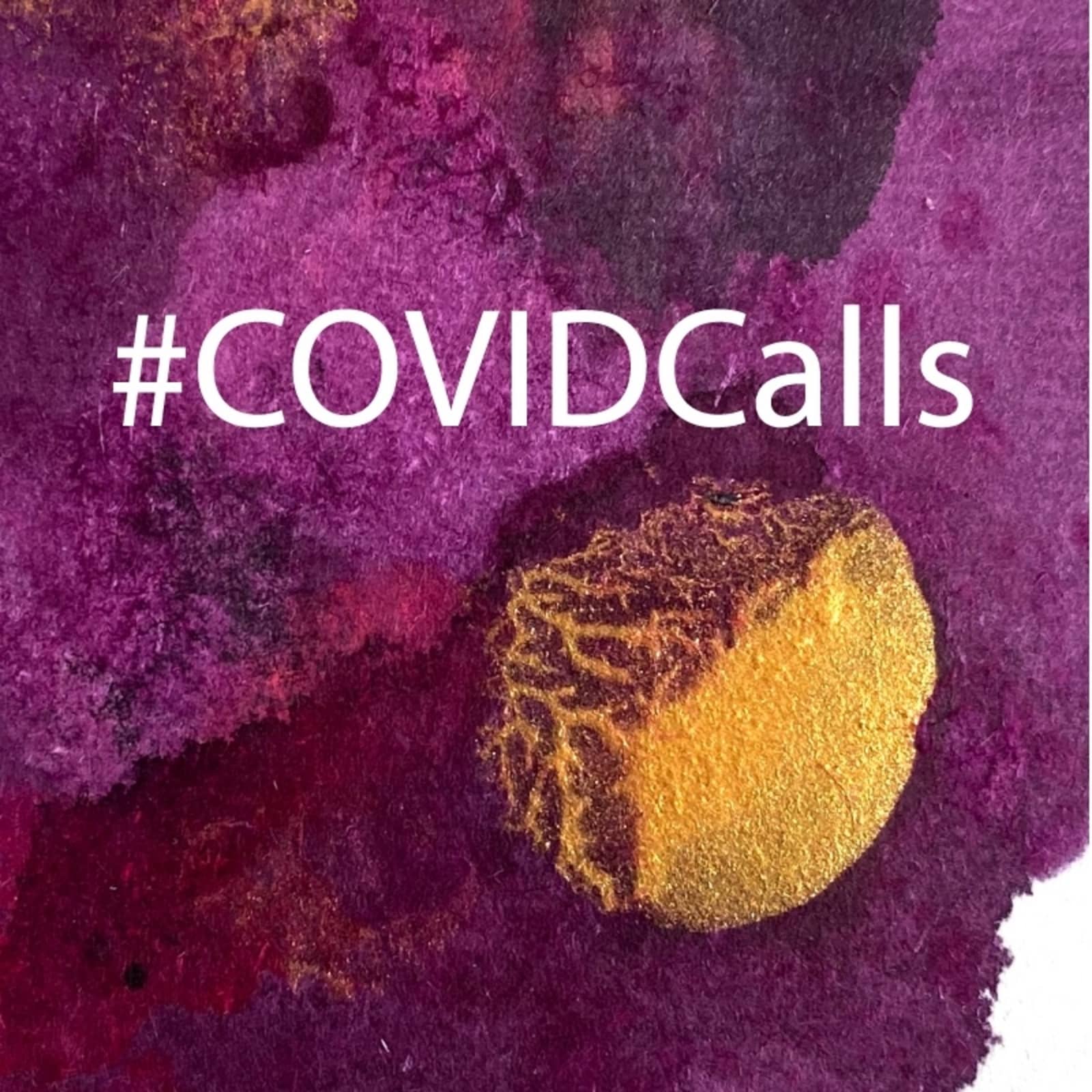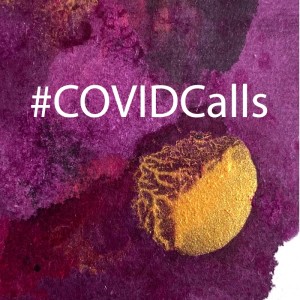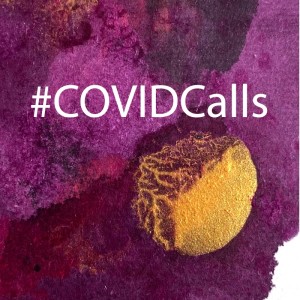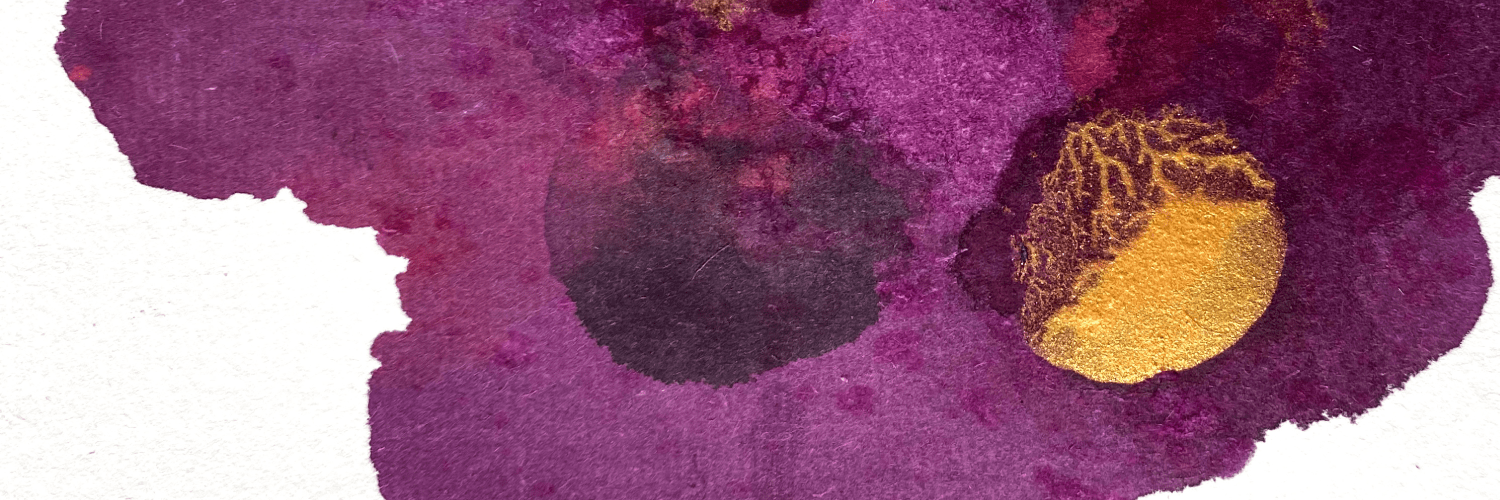
56K
Downloads
504
Episodes
A daily discussion of the COVID-19 pandemic with a diverse collection of disaster experts - hosted by Dr. Scott Gabriel Knowles, a historian of disasters at KAIST in Daejeon, South Korea.
A daily discussion of the COVID-19 pandemic with a diverse collection of disaster experts - hosted by Dr. Scott Gabriel Knowles, a historian of disasters at KAIST in Daejeon, South Korea.
Episodes

Monday Jun 01, 2020
#32 COVIDCalls 4.28.2020 - COVID-19 and Mental Health w/ Maiken Scott
Monday Jun 01, 2020
Monday Jun 01, 2020
With 57,812 confirmed COVID related deaths in the United States as of recording, how will we cope with the amount of death brought about in such a short time by COVID-19? How do we cope with trauma when our usual social connections and interactions are restricted?
Maiken Scott, a Health and Science reporter for WHYY Philadelphia and host of The Pulse a weekly Health and Science show, discusses covering mental health in the COVID-19 pandemic. Scott makes comparisons to other moments of collective trauma while pointing out the unique aspects of trauma associated with COVID-19, like loneliness brought about by social distancing measures. She also discusses the positives and negatives of the shift of mental health services to online spaces. She discusses the use of history during this moment, not as a collection of easy lessons, but as a way to put events into perspective. Scott also discusses the impact of the pandemic on journalism, which was already facing loses to revenue and local news outlets.
For further reading:
“U.S. Coronavirus Deaths Now Surpass Fatalities in the Vietnam War”
“Who wants to hear an audio tour about a disgusting Philly epidemic? 10,000 visitors, that’s who”

Monday Jun 01, 2020
#31 COVIDCalls 4.27.2020 - Pandemics in History IV
Monday Jun 01, 2020
Monday Jun 01, 2020
How can we see past monolithic depictions of nations and understand the underlying differences within national borders that are shaped by demographics, geography, and historical experiences? What can we learn from the Great Sea Islands Storm of 1893 and a bubonic plague outbreak in the 19th century about how local politics and racial animus can shape responses to disaster?
Dr. Caroline Grego, an assistant professor at the Queens University of Charlotte, and Dr. Tiago Saraiva, an associate professor of History at Drexel University, both discuss the links between disaster histories, the histories of racialized politics, and our current experience with COVID-19. Dr. Grego talks about her research on the Great Sea Islands Storm of 1893, how White Supremacists used the hurricane to disrupt Black political power in Jim Crow South Carolina. She also discusses how worries about epidemic disease in the wake of the hurricane connects to racial disparities in COVID-19 deaths in the United States. Dr. Saraiva talks about his own research on the 19th-century bubonic plague outbreak that spread from mainland China, highlighting the politics of covering up epidemics in various cities, the rise of the laboratory, and the politics of race around the plague that affected Chinese-Americans. He also discusses the connections between global capitalism, food production, and the history of pandemics.
For further reading:
“COVID-19 Reveals a Long History of Health Inequities affecting African Americans”
“Why Coronavirus is Killing African-Americans More Than Others”
Fascist Pigs: Technoscientific Organisms and the History of Fascism

Monday Jun 01, 2020
#30 COVIDCalls 4.24.2020 - The Trump Pandemic w/ Virginia Heffernan
Monday Jun 01, 2020
Monday Jun 01, 2020
What explains President Donald Trump’s disastrous response to COVID-19 and can he politically survive the pandemic? What do Trump and his vices say about our society and why can’t we look away?
Virginia Heffernan, a journalist for the New York Times, Wall Street Journal, Political and more, discusses President Donald Trump, his White House’s response to the pandemic, and the effect it might have on his re-election campaign. Heffernan also questions what Trump, and our inability to ignore him, says about our present era. Heffernan talks about how Governors like Andrew Cuomo of New York and Gavin Newsome of California, as well as collections of states are trying to counter Trump’s ineptitude and chart their own paths in the pandemic. She also discusses the power the “canon of plague literature” has for helping us cope with the COVID-19 Pandemic.
For further reading:
“What Donald Trump Doesn’t Get About Disasters”
“Is COVID-19 Donald Trump’s Hurricane Katrina?”
“Mitch McConnell's Bankruptcy Campaign Makes Zero Sense on Any Level”

Monday Jun 01, 2020
#29 COVIDCalls 4.23.2020 - Pandemics in History III: Philadelphia
Monday Jun 01, 2020
Monday Jun 01, 2020
What can public officials and public health experts learn from a series of yellow fever epidemics in the 1790s and other historical epidemics? What factor has race played in emergency management and infectious disease in American history?
Dr. David Barnes, a professor of public health and the history of medicine at the University of Pennsylvania, and Dr. Michael Yudell, Vice Dean and Professor at College of Health Solutions at Arizona State University and former chair of the Department of Community Health and Prevention at Drexel University, both discuss historical analogues for the COVID-19 pandemic in American History. In particular Dr. Barnes and Dr. Yudell discusses Philadelphia’s Yellow Fever epidemic of 1793, its subsequent resurgence, and the similarities to today’s pandemic. Dr. Barnes talks about the contentious politics and practice of quarantine in 1790’s Philadelphia and its parallels into debates over lockdown measures. Dr. Yudell explains the deeper histories that cause harmful effects of disease to map onto social inequalities. Both also discuss the tension between research and activism in advocating for changes in public health policies.
For further reading:
The Making of a Social Disease: Tuberculosis in Nineteenth-Century France
Race Unmasked: Biology and Race in the Twentieth Century

Monday Jun 01, 2020
#28 COVIDCalls 4.22.2020 - Public Health Update + COVID & the Law
Monday Jun 01, 2020
Monday Jun 01, 2020
How much legal power does the U.S. federal government have to regulate states during pandemic? How are various issues related to the pandemic, from shelter-in-place orders, state specific quarantines, limits on religious gatherings, and deportations being litigated? How is Philadelphia dealing with the pandemic in late-April 2020?
Dr. Esther Chernak, professor at the Drexel University School of Public Health, rejoins to provide an update on the state of the pandemic in Philadelphia and the local public health response as of late-April, 2020. In particular Dr. Chernak discusses the vulnerability of elderly in nursing homes, the continued inadequacy of testing, asymptomatic transmission, and various reopening plans. Then, Professor Kathy Bergin, adjunct professor of law at Cornell Law School and member of the steering committee for Project Blueprint, discusses the emerging field of disaster law and legal issues surrounding COVID-19 in America. In addition Professor Bergin talks about her work in the wake of Hurricane Katrina and the 2010 earthquake in Haiti. She breaks down some of the recent legal filings and cases related to COVID-19. Professor Bergin also discusses the constitutional limitations on federal and state powers when it comes to pandemic response.
For further reading:
Institute for Justice and Democracy in Haiti
“Missouri Sues China, Commuist Party Over The Coronavirus Pandemic”
“Kansas Supreme Court Upholds Governors Order Limiting the Size of Easter Services”

Monday Jun 01, 2020
Monday Jun 01, 2020
What are the long term effects of disaster on society? What were the lessons of 9/11 and Hurricane Katrina and to what extent were they heeded?
Dr. Kathleen Tierney, Professor Emerita of Sociology and former director of the Natural Hazard Center at University of Colorado-Boulder, discusses how her long career in disaster research informs her view of the COVID-19 pandemic. In a wide ranging discussion Dr. Tierney talks about how disasters are a “never-ending kaleidoscope” of societal issues, and how vulnerability has social roots. She also talks about the capacity for prosocial response to disaster and how the current neoliberal political economy limits resilience. Dr. Tierney also argues that good disaster planning will require a paradigm shift in how we understand vulnerability.
For further reading:
The Social Roots of Risk: Producing Disasters, Promoting Resilience
“The ‘Mother of All Rorschachs’: Katrina Recovery in New Orleans”
A Paradise Built in Hell: The Extraordinary Communities That Arise in Disaster
“Disaster as war: Militarism and the social construction of disaster in New Orleans”

Monday Jun 01, 2020
#26 COVIDCalls 4.20.2020 - Governance & Disaster: COVID-19
Monday Jun 01, 2020
Monday Jun 01, 2020
How will COVID-19 shape the way the American government operates? Where were the points of governmental failure when it came to the American policy response to COVID and how can the U.S. adjust its policy and politics to deal with future hazards better?
Dr. Rob DeLeo, an associate professor of public policy and global studies at Bentley University, Dr. Thomas Birkland, a professor of public policy at North Carolina State University, and Dr. Kristin Taylor, an associate professor of political science at Wayne University, all discuss governance and policy before, during, and after disasters. Dr. Birkland discusses whether the COVID-19 can be understood as a “focusing event,” in terms of its effects on U.S. policy or if we should use indicator-driven policy as the model for understanding the response. All the researchers debate the extent to which federalism has worked or did not work as intended in response to the COVID-19 Pandemic and the role federal, state, and local governments have in disaster preparedness and response. Dr. DeLeo and Dr. Taylor both discuss new joint research on voter preference around disaster preparedness as well as the structural issues that lead to chronic underinvestment in disaster preparedness. All comment on how COVID-19 might affect the presidential election and how politicians might adjust their agendas to meet the moment.
For further reading:
Lessons of Disaster: Policy Change after Catastrophic Events
After Disaster: Agenda Setting of Public Policy and Focusing Events
Anticipatory Policymaking: When Government Acts To Prevent Problems and Why It Is So Difficult
Agendas, Alternatives, and Public Policies
“The White House Has Erected a Blockade Stopping States and Hospitals From Getting Coronavirus PPE”
Disasters and Democracy: The Politics of Extreme Natural Events

Monday Jun 01, 2020
#25 COVIDCalls 4.17.2020 - COVID & Environmental Justice in Louisiana II
Monday Jun 01, 2020
Monday Jun 01, 2020
How does COVID-19 overlap and intertwine with the deeper histories of Louisiana, and how can we understand these connections? What effect will COVID-19 have on long-term efforts for racial and environmental justice in Louisiana?
Karen Gadbois, the co-founder of The Lens, Dr. Andy Horowitz, an assistant professor of History at Tulane University, and Dr. Beverly Wright, an environmental justice scholar/advocate and executive director at the Deep South Center for Environmental Justice (DSCEJ), all discuss how COVID-19 connects to long-term histories in Louisiana like racism, economic inequality, pollution, and even patterns of sociability. All talk about the resonances they see in the COVID-19 Pandemic and Hurricane Katrina, as well as the ways in which these two disasters have compounded in Louisiana. All emphasize the need to grapple with these entangled history at the same time, despite the difficulty. Drawing on their experience with Katrina, Dr. Wright and Gadbois also discuss how activists, organizers, and journalists can sustain themselves economically, physically, and emotionally in the months and years ahead.
For further reading:
Race, Place and the Environment after Hurricane Katrina

Monday Jun 01, 2020
#24 COVIDCalls 4.16.2020 - COVID & Environmental Justice in Louisiana I
Monday Jun 01, 2020
Monday Jun 01, 2020
How are the racial injustice of slavery and environmental injustice of petrochemical plants compounding to impact the health effects of COVID-19 in southern Lousiana? How are communities, especially communities of color, responding to a high COVID death rate amidst the continuing legacies of racial and environmental injustice?
Dr. Joy Banner, the Director of Media and Marketing at Whitney Plantation, Sophie Kasakove, a freelance reporter based in New Orleans, and Ashley Rogers, the Executive Director of Whitney Plantation and doctoral student at Louisiana State University, discuss the state of the pandemic in St. John the Baptist Parish and how past and present injustices are exacerbating the effects of COVID-19. Dr. Banner and Rogers discuss the long history of extractive logic that connects the economies of sugar plantations and petrochemical plants in southern Louisiana and how that has affected Black Americans in the region. Dr. Banner and Rogers also talk about their work on Whitney Plantation and how the site presents the perspective of enslaved people. Kasakove talks about her reporting on the effects of pollution from petrochemical plants on nearby residents and how pollution links to underlying conditions like asthma that can make people vulnerable to COVID-19. She also talks about how communities affected by the petrochemical industry have organized and engaged in activism in response to pollution and further development.
For further reading:
‘Cancer Alley’ Has Some of the Highest Coronavirus Death Rates in the Country
Concerned Citizens of St. John
“New Research Links Air Pollution to Higher Coronavirus Death Rates”

Monday Jun 01, 2020
#23 COVIDCalls 4.15.2020 - Disaster Plans & Disaster Realities w/ Lee Clarke
Monday Jun 01, 2020
Monday Jun 01, 2020
What level of risk will we choose to accept and how do we come to accept it? Is that choice rational or irrational? How do organizations plan for worst case scenarios and to what extent are those plans works of fiction?
Dr. Lee Clarke, a professor of sociology at Rutgers University, discusses his research on risk, organizations, disaster plans, and elite panic in connection with COVID-19. Dr. Lee talks about “worst case” events like Hurricane Katrina or COVID-19 and how they stretch the imagination of those witnessing them. He also talks about the difference between “probabilistic” and “possibilitistic” thinking and how these categories help us understand seemingly irrational choices. He also discusses how disaster plans and models are “fantasy” documents, and discusses the dangers of early COVID-19 models being inaccurate. Dr. Lee also discusses the inherent interdisciplinary nature of disaster research and the problems COVID-19 will pose to doing further disaster research.
For further reading:
Mission Improbable: Using Fantasy Documents to Tame Disaster
Worst Cases: Terror and Catastrophe in the Popular Imagination
